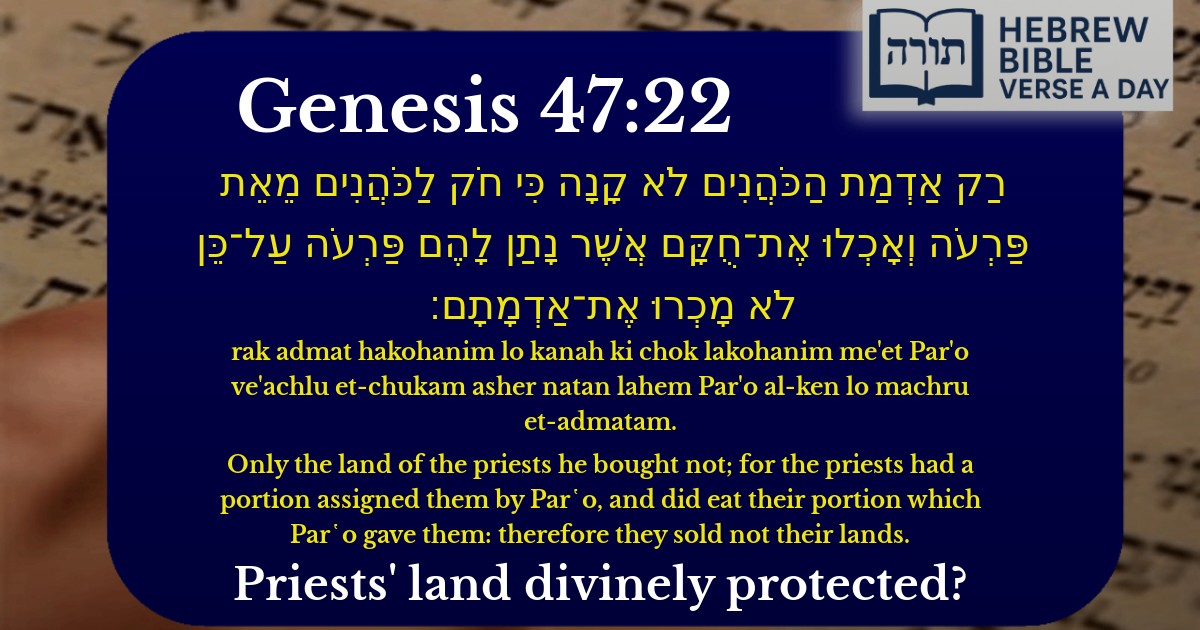Join Our Newsletter To Be Informed When New Videos Are Posted
Join the thousands of fellow Studends who rely on our videos to learn how to read the bible in Hebrew for free!
Hebrew Text
רַק אַדְמַת הַכֹּהֲנִים לֹא קָנָה כִּי חֹק לַכֹּהֲנִים מֵאֵת פַּרְעֹה וְאָכְלוּ אֶת־חֻקָּם אֲשֶׁר נָתַן לָהֶם פַּרְעֹה עַל־כֵּן לֹא מָכְרוּ אֶת־אַדְמָתָם׃
English Translation
Only the land of the priests he bought not; for the priests had a portion assigned them by Par῾o, and did eat their portion which Par῾o gave them: therefore they sold not their lands.
Transliteration
Rak admat hakohanim lo kanah ki chok lakohanim me'et Par'o ve'achlu et-chukam asher natan lahem Par'o al-ken lo machru et-admatam.
Hebrew Leining Text
רַ֛ק אַדְמַ֥ת הַכֹּהֲנִ֖ים לֹ֣א קָנָ֑ה כִּי֩ חֹ֨ק לַכֹּהֲנִ֜ים מֵאֵ֣ת פַּרְעֹ֗ה וְאָֽכְל֤וּ אֶת־חֻקָּם֙ אֲשֶׁ֨ר נָתַ֤ן לָהֶם֙ פַּרְעֹ֔ה עַל־כֵּ֕ן לֹ֥א מָכְר֖וּ אֶת־אַדְמָתָֽם׃
רַ֛ק אַדְמַ֥ת הַכֹּהֲנִ֖ים לֹ֣א קָנָ֑ה כִּי֩ חֹ֨ק לַכֹּהֲנִ֜ים מֵאֵ֣ת פַּרְעֹ֗ה וְאָֽכְל֤וּ אֶת־חֻקָּם֙ אֲשֶׁ֨ר נָתַ֤ן לָהֶם֙ פַּרְעֹ֔ה עַל־כֵּ֕ן לֹ֥א מָכְר֖וּ אֶת־אַדְמָתָֽם׃
🎵 Listen to leining
Parasha Commentary
📚 Talmud Citations
This verse is not quoted in the Talmud.


Context of the Verse
This verse appears in Bereshit (Genesis) 47:22, describing Yosef's economic policies during the years of famine in Egypt. While Yosef acquired all the land of Egypt for Pharaoh in exchange for food, the verse specifies that the land of the priests remained untouched.
Rashi's Explanation
Rashi (Rabbi Shlomo Yitzchaki) comments that the priests (Kohanim) did not sell their land because they already received a fixed portion (chok) from Pharaoh. Since they were sustained by Pharaoh's provisions, they had no need to sell their land for food. Rashi emphasizes that this exemption was unique to the Egyptian priests, not a universal principle for all priests.
Rambam's Perspective
Rambam (Maimonides) in Hilchot Shemitah v'Yovel (13:12) discusses the laws of land ownership for Kohanim and Levi'im in Israel. While this verse describes Egyptian practice, Rambam contrasts it with Torah law, where Kohanim and Levi'im receive portions (terumah and ma'aser) but still retain their ancestral lands.
Midrashic Insights
Halachic Implications
The Kli Yakar (Rabbi Shlomo Ephraim Luntschitz) observes that this verse underscores the importance of sustaining spiritual leaders. Though discussing Egyptian priests, it implicitly teaches that those dedicated to Divine service should not be burdened with material struggles, a principle later codified for Kohanim and Torah scholars in Jewish law.
Symbolic Interpretation
The Or HaChaim (Rabbi Chaim ibn Attar) suggests that the priests' retained land symbolizes the eternal portion of the Jewish people—the Torah. Just as the priests' land was inalienable, the bond between Klal Yisrael and Torah cannot be severed, even in exile.